What’s it like to be a rhino ranger?
Nat Geo Kids goes into the wild with the Black Rhino Conservation Programme…
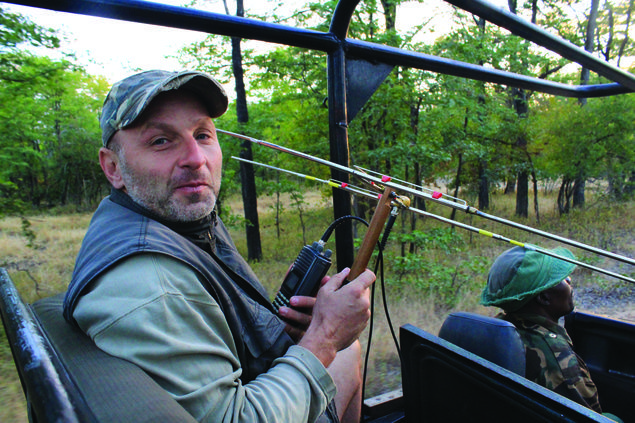
Ever wondered what it’d be like to track rhinos through the wild? We experience a morning in the lives of the amazing people working to save the black rhino!
Our adventure starts in Liwonde National Park in Malawi, Southeastern Africa. It’s 5am and we’re about to venture into the wilderness to track down a 1.4 tonne, double-horned black rhino – and yes, we’re terrified!
Our guides, Hungarian rhino specialist Krisztián Gyöngyi and expert rhino tracker Christopher Kanyange, belong to an elite team in Liwonde National Park, whose job is to monitor and protect the rhinos, and rescue those that have been trapped in poachers’ snares and traps.
Christopher reassures us that rhinos are shy and friendly animals, but adds, “We may encounter threats from other wild animals” – uh oh!
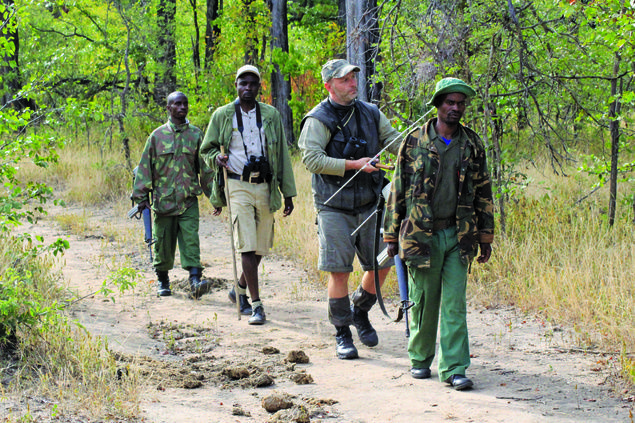
A short electrified fence borders the 40km2 Black Rhino Sanctuary, located deep within the national park. It”s not long until Krisztián picks up the signal of a bull (male rhino), named Ntangai on his detection equipment, which can tell when rhinos – fitted with radio transmitters – are in the area.
Krisztián takes an ash-filled sock out of his pocket and gives it a shake. The grey dust moves in the breeze. He’s checking the wind direction, making sure the rhino can’t sniff us out with his amazing sense of smell. If he senses our presence, he may (out of pure curiosity) come a bit closer to check us out – but if we scare him, he might run off at speeds of up to 40kmph!
Rhinos have very poor eyesight and can only run in a straight line. So, if he runs towards us, all we need to do is move to the side, out of his way, and crouch behind a bush. Well, that’s the theory, anyway…
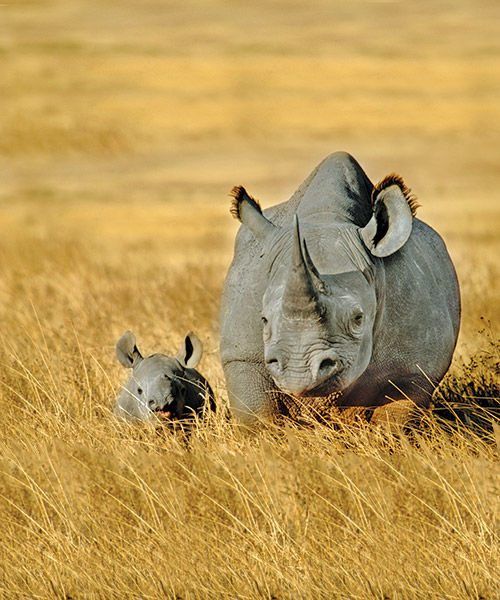
Suddenly, Krisztián frantically starts making the ‘danger’ sign (see below) and gestures towards some bushes. A huge hooded snake is slithering off into the undergrowth! Christopher tells us: “That was a Mozambique spitting cobra – it’s a very dangerous animal!” Eek!
These scary snakes can rear up and spit venom 3m towards their target, causing blindness. Their bite can cause serious damage, too – so we’re relieved the 2m monster wriggles away when Krisztián tells us, “That’s one of the largest ones I’ve ever seen!”
We’ve been tracking the bull in sweltering heat for over 7km now, and finally he seems to have slowed down. “The signal is intense now,” Krisztián whispers. “The rhino is within 80 metres!”
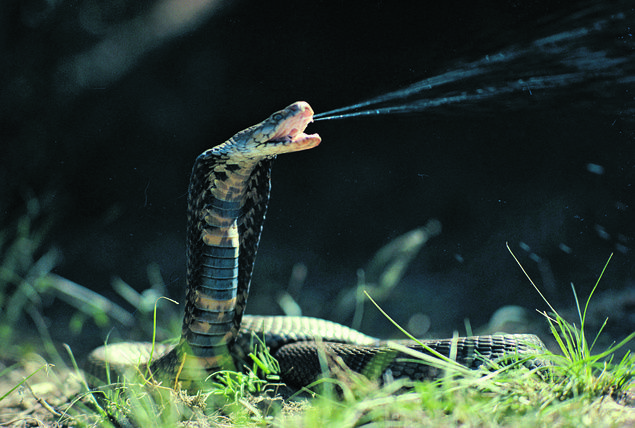
Finally, we make out a huge grey rump and a hairy twitching ear as Ntangai browses on some shrubs. We get a delightful view of his big bum for a few seconds, before he disappears into the thick bush.
Finding a healthy rhino, uninjured and without disturbing him, is a successful trip for the rangers, but unfortuntately not all have such a happy ending as this one.
A staggering 96% of black rhinos were lost to poaching between 1970 and 1995, and entire populations have been wiped out in some African countries because their horns are used to make traditional ‘medicine’ in Southeast Asia and the handles for a type of dagger (called a jambiya) in Yemen in the Middle East.
Today, poaching is still the biggest threat to rhinos, but their numbers are slowly rising thanks to dedicated conservation efforts. Rangers at The Black Rhino Conservation Programme at Liwonde Park in Malawi are helping to restore this iconic species.
Christopher says of the day’s work:
“The moment we find the rhinos, and they are in good condition, we feel happy. We feel it in our heart. Because this is our animal. And a very important animal for the whole world.”
Check out more about the rhino rescue effort at malawianrhinos.com.
Communicate like a rhino ranger!
To go on rhino patrol you’ll first need to learn the hand signals. Rhinos have excellent hearing, so knowing how to communicate silently is key to tracking one down!
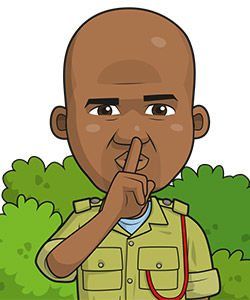
SILENCE!
Shhhh, danger is near!
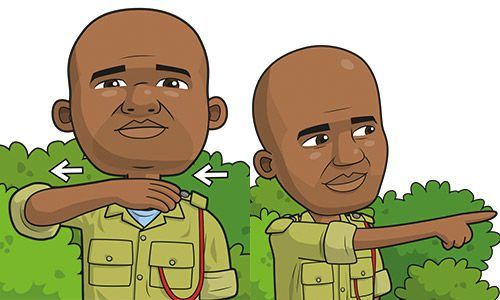
DANGEROUS ANIMAL NEARBY!
Oughta come in handy when a Mozambique spitting cobra’s on the prowl!

COME TO ME!
Gather round, guys!
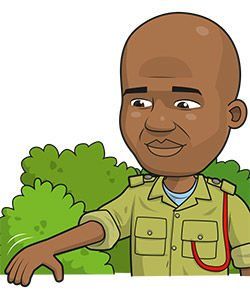
SPOOR FOUND!
“Spoor” is another word for footprints!
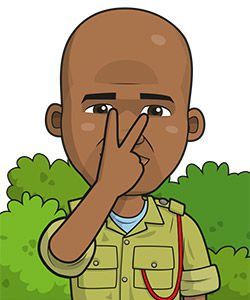
I SEE A RHINO!
Point at your eyes, then at the location of the animal!
Check out this cool footage of a curious rhino captured on camera!
Nat Geo Kids travelled to Malawi courtesy of Mahlatini Luxury Travel and Kenya Airways. For information about family-friendly tailor-made trips to Malawi, check out mahlatini.com
Find out more about Malawi at malawitourism.com and safaris at cawsmw.com
Would you like to be a rhino ranger and help protect this rare species? Let us know what you think by leaving us a comment below!
More Like General Animals
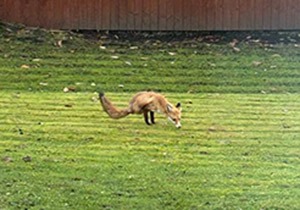
Two-legged fox spotted
in garden!
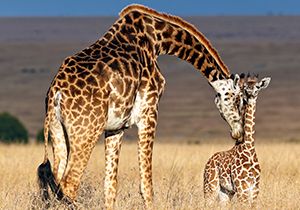
10 giraffe facts!

Hedgehog Facts!
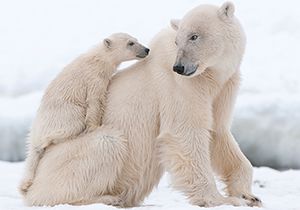




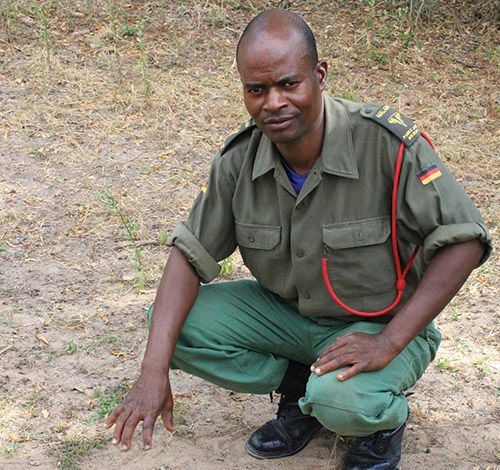




LEAVE A COMMENT
THANK YOU
Your comment will be checked and approved shortly.
WELL DONE,
YOUR COMMENT
HAS BEEN ADDED!
COMMENTS
Cool
so cool
being a rino ranger looks cool so yes
Congratulations, Krisz for your newborn baby! Im very proud of you and I wish you a lot of success in your life and in your intresting work.
CUSTOMIZE YOUR AVATAR